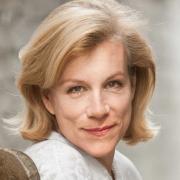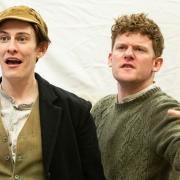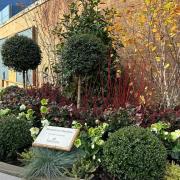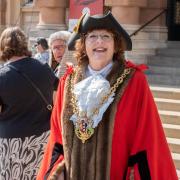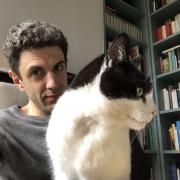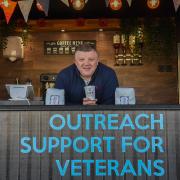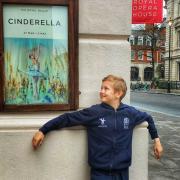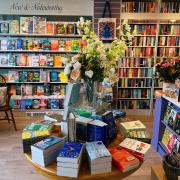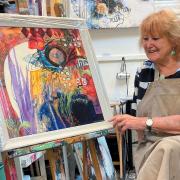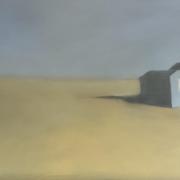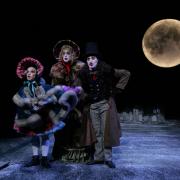To celebrate International Women’s Day we profile four inspirational women making their mark in Suffolk and beyond – in very different ways through art, education, and a social enterprise

BODY POSITIVE
Michelle Watson, artist
Michelle Watson paints breathtakingly beautiful nudes. I'd seen her paintings in a local gallery, so I was excited to interview her in her garden studio, next to a thatched Suffolk cottage with countryside views. I wasn't disappointed; a large painting of a nude was centre stage among the paints and scattered canvases.
Michelle's story is inspiring. She took a fine art degree while she still had five children living at home, something she describes as the scariest thing she ever did. She was always creative with her children; now her work is liberating and empowering other women. She has a queue of models, keen to pose. Michelle is driven not just to paint but to help give women confidence and describes painting as 'creating a connection'.
She started drawing early; as a teen she would sit on street corners to draw and learn perspective. She went to art school and for four years learnt many methods and techniques, leading to working at the theatre.
'I’m not actually a painter in that sense,' she says. 'I think sculpturally in 3D, and I went into theatre initially, costumes. I loved the fabrics and the texture.' In the early working years she ‘drew all the time, whatever job or whatever path’ and had various roles, including as a trainee editor at Marvel Comics. When motherhood beckoned, art became sidelined.
Family life took her to Malaysia where she was involved in making backdrops for theatre productions at the International School. 'After having five children, it rebooted me back to what I wanted to do– I loved the scale. Something flowed within me; I just connected with it.'
When the family returned to the UK she threw herself into a fine art degree. In her first year she studied sculpture and loved working with clay and welding. Then she was introduced to oil paints. 'The colours were vibrant, they were thick, almost like working with a clay themselves.'
Michelle was hooked, seeing the enormous scope that oils would bring to her work. Her very first painting was simply the female form without a setting, but her tutors asked her to put the figure into a background, to give it a story. ‘That didn’t say what I wanted to say,’ she says, even now agonised by it. It was the turning point in her career.
'I didn’t want a narrative, it was solely about them. All I was thinking about was that figure, what it was going through, what it was thinking, what it was feeling – and then, of course, you realise that’s part of you that you put into your painting too.'
Michelle talks about her art with passion and fervour. It's clear how she has managed to create such a strong connection between her painting and her audience. She undertook intensive research on what her art was about and found she had to put her ‘heart and soul out there’, to paint the things she was struggling with as she aged, the things she found difficult.
'Our insecurities are our bodies and we start to hide them more as we get older. How can I do it in a way that it’s beautiful and empowering? The only way to learn that was to actually start to paint that. I was painting all of the signs of ageing, all of the things that bring you down. The menopause, the age spots, you can go on and on. I want to incorporate the whole lot and see how it comes out.'
She sees every part of the painting process as empowerment; the woman sitting for her feeling confident for having the courage to do it, the conversation they have while she paints, the mark making which takes all the ‘ugly’ bits of the body and creates an abstract beauty.
“I started asking the people that model for me, how do you feel knowing what my work is about? They just said I still find them beautiful and I love the fact you’ve taken my stretch marks and amplified them, you’ve not made it so real. In some ways it’s an abstract of all the things they’re going through and that makes their connection stronger to the work.”
See Michelle’s work on instagram @michellewatsonart and michellewatson.art
By Angeline Braidwood

MAKING AN IMPACT
Kate Smith, co-founder of Hey Girls
Kate Smith is co-founder of Hey Girls, a groundbreaking social enterprise set up to tackle a taboo subject – period poverty and the shame many associate with menstruation.
It's a Suffolk family business. As well as selling sustainable period products through its website, it wholesales to corporate customers – companies and workplaces who want to improve employees' 'period dignity' – and supplies independent eco stores and supermarkets. Hey Girls donates 100 per cent of its profit to funding the fight to eradicate period poverty and has donated more than 33 million period products, distributed by charities and community organisations in a 'partner network'.
All of which has won Hey Girls numerous awards and nominations, including Social Enterprise of the Year, and a place in the Social Enterprise Top 100.
It all began in 2018, set up by Kate’s mum, Celia Hodson. Kate and her sister, Bec, did what they could to help while meeting the challenges of being new parents.
'Mum has a very long history of working in social enterprise,' says Kate. 'That’s her passion; she is the queen of social enterprise and has been our mentor.' Why choose period poverty? Kate and her sister had an upbringing in which no topic was taboo, which in turn created an incredible family mission. She is very honest about her family having struggled at times. They understand what it’s like to face difficult decisions about what you can and cannot buy.
'Mum has essentially raised feminists, people who are really driving equal opportunities for women in everything. As a family we’ve gone through hard times for ourselves; Mum has had to make some difficult choices. We know what it’s like to live in poverty.' This is at the heart of Hey Girls, reducing the stigma of menstruation and ensuring that there are no barriers to accessing products. And it’s not just women working at Hey Girls; Kate’s stepfather, Steve, is the head of operations and her brother, Chris, is general manager.
Kate’s own background in local government and early years provision has stood her in good stead. 'We all pull together and play to our strengths,' she says. 'My brother and stepdad are brilliant with the legal side of things, whereas my strengths lie in education and communications. I found my passion when I had my little girl, supporting other parents and all the different challenges.'
Running the children’s centre in Leiston really opened her eyes to people's day to day needs, and this is reflected in the way Hey Girls looks after its staff. For example, Kate and her partner benefit from the company’s flexible working policy which enables them to do the school run at times that work for them. It’s a small thing, says Kate, but important when you are a parent, or you're adjusting to work after not being employed for some years.
Kate says her mum talks a lot about the 'give-back' of Hey Girls; for every product purchased they donate the exact same product. It’s simple and extremely successful. Donations are made through community initiatives, such as food banks and shelters. One of their most popular items is a ‘caught short service’ – free vending machines located in staff washrooms, which keep people at work who would otherwise have had to go home or pop out to the shops.
In her role as donations and education director Kate delivers an awareness programme through community groups and schools. She is so enthusiastic and empathetic, describing awareness as ‘a conversation for all’, and says when she delivers talks in schools it’s the boys who are curious and ask all the questions.
'Girls tend to sit quietly and listen,' she says. 'Because it’s not going to happen to them, boys are a bit more forthcoming with the questions.' The outreach programme also helps people understand period poverty, spreads awareness of different products available, explains how the community partner network works and the donations that this creates.
Huge thought has gone into everything that Hey Girls does, whether it’s offering a wide variety of products to meet different needs, caring for staff or working hard to make a truly sustainable company. All products are biodegradable within six months, and they were the first brand to print ‘do not flush’ on the packaging.
By Angeline Braidwood

THE POWER OF STORIES
Ellisha Soanes, Equality, Diversity & Inclusion specialist
On a warm weekend of sunshine and showers I met the inspiring Ellisha Soanes at the Primadonna Festival in Stowmarket, held every summer at the Food Museum, a wonderfully inclusive occasion when the whole family can enjoy music, reading and writing.
Ellisha was interviewing a children’s writer about her first novel. My 16-year-old daughter and I were drawn by the warmth of her tone and genuine interest in the young author, as we heard about the passion that had created a brilliant book for young readers. When I eventually got the chance to interview Ellisha, I discovered that this ability to draw people out, to show real empathy and build people up is her superpower.
Ellisha is a storyteller, a skill she uses to empower others. A co-director of Aspire Black Suffolk, and head of equality, diversity and inclusion (EDI) at three of the region's colleges, she’s also a mother of two and a mentor to young people in Suffolk. Yet, she recalls how, as a young person of mixed heritage in Suffolk, she didn’t receive the kind of mentoring or empowerment that she now strives to give others.
'I was told there was no point in trying,' she says. But rather than allowing herself to be written off, Ellisha worked hard and followed a path in the health and social care sector, where she is now a lecturer. She talks warmly about her background as a ‘Suffolk pumpkin’ on her mother’s side, with grandparents from the Windrush generation on her father’s. Her pride in her heritage is something she brings to her work and she has been recognised with multiple awards, including being named as one of Glamour Magazine’s top 15 most influential Black women in the UK.
While some of Ellisha’s work is at strategic level, such as helping educational establishments implement EDI policies, she says: 'You can’t do things strategically without knowing what’s on the ground.' So, she gets hand-on with her students and doesn’t just lecture but fosters their innate desire to learn and understand more.
'I like to see what’s going on,' she says. 'I actually like to talk to young people. I like to see what their views are and how we can help them.' One pertinent example was when she was working with a group of students online during the pandemic. They wanted to create a tribute to George Floyd, but they also wanted to learn more about black history. So, they took it upon themselves to teach one another, increasing their cultural understanding. Ellisha, through listening and signposting, was able to help them turn a wish into active change.
Ellisha is proud of having co-written Elimu - The Little Book of Knowledge, an interactive history book telling the untold black history of Suffolk residents, which was made freely available to schools all over Suffolk, Essex and Norfolk. Another way she found to share this was through the innovative Power of Stories project, which toured awe inspiring costumes from the Marvel film Black Panther around rural communities in East Anglia in 2022. It proved an inspirational way of unlocking stories and sharing cultural backgrounds with people who hadn’t had a chance to explore and talk about their own family history. It was a huge success, and not just amongst Marvel fans.
Through Aspire Black Suffolk, Ellisha delivers workshops to schools, increasing understanding of multicultural Ipswich and Suffolk, while her daughter, A'niah, has been creating cultural change herself by establishing a Black History reading group at her junior school, and helping her classmates learn more about the heritage of those around them.
It’s hard not to get swept up in Ellisha’s call for action of ‘we can change mindsets through education’, and easy to see how young people can relate to her enthusiasm and experience. Ellisha’s own journey is a powerful story in itself. 'It's important to empower people, and help them navigate and support people on their own journeys and opportunities,' she says.
For Ellisha, this always starts and ends with education; if young people are encouraged to ask questions and teach each other through their own lived experience, she says, then acceptance and cultural diversity can flourish and be celebrated here in East Anglia and beyond.
By Angeline Braidwood

GOING SOLO
Carla Elizabeth, artist
This March, artist Carla Elizabeth will have her first solo exhibition. You could ask her why it’s taken her decades to find herself so happily ‘at home’ with this creative pursuit – and she’d likely tell you ‘it’s a marathon, not a sprint’.
Sitting on the shoreline in Felixstowe, she is seemingly transfixed by the dancing waves noisily performing in front of her. Camera in hand, oblivious to the chilly air, she’s capturing the spirited coastal scene in anticipation of another creative studio session. With such confidence and focus, it’s as if this had been her focus from birth.
In fact, it’s only since Covid that the hugely successful self-employed graphic designer has dared ‘unleash her talent’ for public consumption. 'Isn’t it funny how we let fear get in the way, and we can hide from something we were clearly meant to pursue?' she asks. 'I’ve always loved art – as far back as I can remember.
'After school here in Suffolk, I went on to study art history and studio art at Anglia Ruskin University, but even then, I didn’t feel it was a pursuit I could make into a career. You could say I sort of ‘parked it’, and instead took the route of becoming a graphic designer.'
Carla held leadership positions as part of the graphic design team for a magazine publisher, before opting to set up her own self-employed business in 2017. Since then, she has worked for many regional and national brands, helping them create or define visual identities, but there was something missing.
The lure of the canvas was calling but she was fearful. Then Carla began to tap into the mentality and focus she uses for another big time-consumer in her life – marathon running.
'The ironic thing about me is, I’m not a natural runner, and I’m not from an athletic family, but I’ve now ticked off over 25 marathons and a couple of ultra-marathons, including the Montane Lakeland 50, a challenging 50-mile race across the Lake District in 24 hours.
'When I was beginning to think about my fear of pursuing art – which was triggered by Covid, when so many of us were reassessing what our priorities and ambitions were – I kept thinking about my tentative steps into running.
'I was so out of breath at first that I was sure I was asthmatic, but I kept going, and I realise now that it’s the running in my life which always makes me feel that "the impossible is possible". Eventually I decided it was time I allowed myself to resurrect the art.'
After privately starting to tackle a few portraits and scenes, Carla was then drawn to enter the Big Hoot competition in Ipswich. She was successful, and in turn began to breathe more life and momentum into her own work, for sale and for joy.
'For several months I focused on animal portraits, and I loved it, but something still wasn’t quite aligning in my heart,' she explains. Recalling the day she was searching for a photo of a dachshund she had been intending to paint, she says: 'Unintentionally, I fell upon a photo of the sun shining on the sea, with the waves breaking at the shore. It felt right. It was familiar and comforting, and I knew I had to try to interpret the photo into pastels.
'I posted the final result on social media and got such an overwhelmingly positive reaction that I was encouraged to do more. From that one event, painting seascapes has become my preferred niche, and it’s what visitors will see when they come to my first solo exhibition in March.'
It’s already looking like a very busy 2024 for Carla as she continues her graphic design work, trains for her next marathon – and seeks out more exhibitions in order to raise an audience for her beautiful coastal work.
'I really feel I’ve found my place,' she says. 'I’m not nervous about the exhibition, just filled with anticipation and excitement – much like doing my first London Marathon in 2012.
' Nowadays, whenever I doubt myself, I say ‘believe the impossible is possible’…and somehow, I manage to prove it to myself.'
Carla is exhibiting March 13-20 at the Crafthouse in Woodbridge. carlaelizabeth.co.uk
by Deborah Watson




